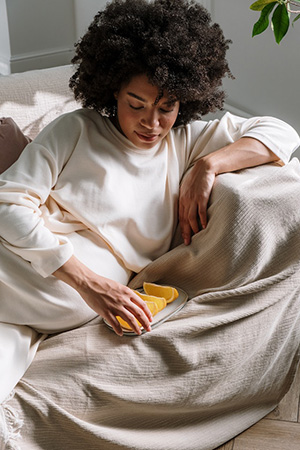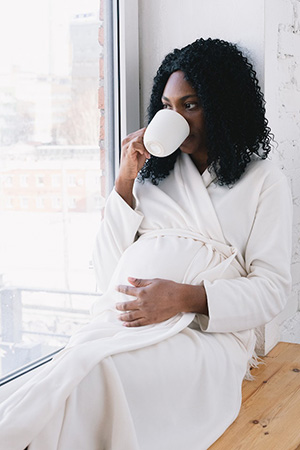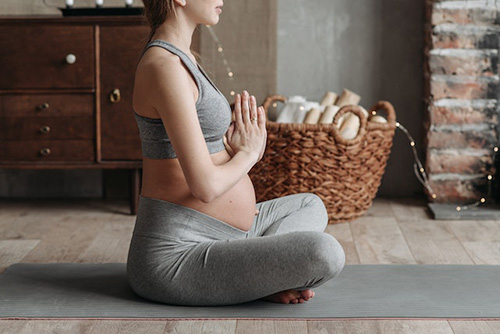Contents
- 1 Understanding anxiety disorders during pregnancy
- 2 Symptoms of anxiety disorders during pregnancy
- 3 Causes and triggers of anxiety during pregnancy
- 4 Herbal remedies for anxiety relief: tea blends and essential oils
- 5 Homeopathic medicines for anxiety during pregnancy: Arsenicum and Argentum Nitricum
- 6 Alternative therapies for anxiety relief: massage therapy, acupuncture, yoga
- 7 Acupuncture: An Ancient Practice for Modern Relief
- 8 Coping strategies for anxiety during pregnancy: meditation, deep breathing, faith, and prayer
- 9 The importance of self-care and natural remedies for managing anxiety during pregnancy
Natural remedies for pregnancy anxiety come without the possibility of adverse side effects. They provide a secure and efficient method for promoting relaxation. Stress can be difficult to manage during pregnancy when you want to avoid medications or other therapies that can harm your unborn child.
A popular natural treatment for anxiety during pregnancy is a rescue cure. This cure, created from flower essences, might help you relax and lessen stress. You have the option of taking it orally or topically.
Another fantastic all-natural treatment for anxiety during pregnancy is infused baths. Infusing bathwater with calming essential oils, such as lavender, chamomile, or ylang-ylang, can aid relaxation.
Supplements that contain a few drops of relaxing essential oils also help pregnant women feel less anxious. There is evidence that soothing essential oils like frankincense, bergamot, and lavender can help reduce tension and anxiety.
While natural therapies can significantly lessen anxiety during pregnancy, it is always advisable to seek the guidance of a healthcare provider before using any new treatment or supplement. Based on your medical history and current state of health, your doctor will advise you on what will be best for yourself and your unborn child.
If you incorporate them into your routine, natural cures can significantly enhance your overall experience during this thrilling but occasionally stressful time. These treatments can support a peaceful and relaxed condition for you and your infant day or night.
Understanding anxiety disorders during pregnancy
Up to 15% of pregnant women experience anxiety issues during their pregnancy. Mild anxiety to severe panic attacks can be a symptom of many illnesses. They may significantly affect expecting moms’ mental health. Due to hormonal changes and concerns about the fetus’s health, the first trimester is a concerning time for developing anxiety and depression.

Expectant mothers should know that worrying or feeling anxious is common throughout pregnancy. But suppose these emotions overpower you or interfere with your regular life. In that case, it can be a sign of an anxiety problem. Excessive concern, restlessness, weariness, irritability, trouble sleeping, and physical symptoms, including muscle tension and headaches, are a few of the prevalent symptoms.
Preterm birth, low birth weight, and developmental impairments in the fetus can result from untreated anxiety and stress during pregnancy. Women who are expecting and have anxiety issues must contact a doctor immediately.
Cognitive-behavioral therapy is a successful therapeutic option for anxiety issues during pregnancy (CBT). CBT assists people in recognizing harmful thought patterns and learning coping mechanisms to control their symptoms. During pregnancy, this kind of therapy is both secure and productive.
Lifestyle changes can assist in controlling pregnancy anxiety in addition to counseling. Pregnant women with anxiety and depression symptoms have been found to benefit from regular exercise. A balanced diet of omega-3 fatty acids, vegetables, fruits, whole grains, and lean proteins can also enhance mood.
Pregnant women with anxiety disorders need to prioritize self-care practices, including getting enough sleep every night and taking regular breaks to unwind. Deep breathing exercises and meditation are two mindfulness practices that can be used to manage stress or concern.
For many women, pregnancy can be both an exciting and stressful time. Expectant moms with anxiety issues require assistance from their medical experts, close family members, and mental health specialists. Women can control their anxiety symptoms and have a safe pregnancy with the proper care and self-care techniques.
Symptoms of anxiety disorders during pregnancy
Anxiety disorders during pregnancy are frequently characterized by excessive fear for the baby’s future or health and worry and trepidation. Due to hormonal changes and added stress, women with a history of anxiety disorders may have elevated anxiety levels when pregnant. Early detection of these symptoms is crucial, as is seeking medical help if they worsen or if side effects such as trouble sleeping or eating start to appear.
Women’s degrees of anxiety throughout pregnancy can differ from one another. While some women struggle with mild anxiety, others struggle with more severe anxiety disorders. It’s crucial to realize that there isn’t a single method for treating anxiety issues during pregnancy.
Physical Symptoms
Pregnancy-related physical symptoms of anxiety disorders include a rapid heartbeat, sweating, shortness of breath, nausea or vomiting, dizziness or fainting spells, headaches or migraines, and soreness in the chest.
Side Effects
The mother and the child may suffer negative repercussions if anxiety is not managed. Depression can result from stress, raising the danger of preterm birth and low birth weight. According to Postpartum Support International (PSI) data, untreated anxiety can result in postpartum depression, impacting up to 15% of new moms.
Treatment Options
For pregnant women with anxiety problems, there are many therapeutic options available. These include counseling, medicine, and complementary therapies like yoga or meditation.
Medication
For pregnant women exhibiting significant anxiety symptoms, medication may be administered. Not all medicines, it’s crucial to remember, are safe for expectant mothers. Before taking any medicine while pregnant, women should always check with their doctor.
Causes and triggers of anxiety during pregnancy
Hormonal changes might bring on anxiety in pregnant women. Because of the hormonal modifications conveyed by pregnancy, anxiety is a typical symptom among pregnant women. The considerable rise in estrogen and progesterone levels may impact pregnant women’s moods and emotions. Anxiety, anger, and mood swings might result from these hormonal changes.
Pregnant women may experience anxiety due to financial troubles, marital problems, or employment loss. For pregnant women, dealing with their concerns might be challenging if they don’t have support from their family or friends.
To give pregnant women experiencing anxiety the proper support and care, healthcare professionals must be aware of these triggers and causes. Pregnant women can experience less stress in a supportive setting that offers counseling services, information on coping mechanisms, and access to resources like support groups or online forums.
According to one study, up to 15% of pregnant women exhibit symptoms of anxiety disorders. According to other research, prenatal maternal stress was linked to a higher likelihood of behavioral issues in kids. These results underline how crucial it is to manage maternal mental health throughout pregnancy.
Numerous physical and psychological changes in a woman’s body take place during pregnancy. Even while a certain amount of stress is expected at this time, excessive concern or panic should not be disregarded. Imagine you are going through signs of an anxiety disorder, including excessive worry, panic attacks, or trouble sleeping. In that situation, getting medical assistance is crucial.
Increase Water Intake
Drinking adequate water is necessary for overall health and helps lessen the effects of anxiety. A bare minimum of eight to ten glasses of water daily helps keep the body and mind relaxed and tranquil. Our bodily systems fall out of balance when we are dehydrated, which causes emotions of tension and anxiety.
Water is crucial for washing away impurities, maintaining body temperature, and delivering nutrients throughout the body. Additionally, it supports good blood pressure levels and promotes mental calmness.
It’s crucial to remember that treating anxiety disorders with water alone isn’t always a guarantee. Nevertheless, it can help treat symptoms with other natural therapies like exercise or therapy.
Limit Caffeine Intake
As a stimulant, caffeine can raise heart rate and amplify anxiety. One 12-ounce cup of coffee has 200 milligrams of caffeine, the daily maximum for pregnant women. Everyone reacts to caffeine differently; some may get more anxious after even small quantities. Others might be able to take larger doses without experiencing any adverse side effects.
The best course of action is to completely abstain from caffeine if you suffer from anxiety symptoms frequently or severely. If you’re not ready to give up your morning coffee, consider switching to decaf or gradually reducing your consumption.
Eat Healthy Food
A balanced diet of fruits, vegetables, whole grains, and lean protein can lessen anxiety symptoms. Foods strong in omega-3 fatty acids, like walnuts and salmon, can also relax the brain.
Because omega-3 fatty acids are essential lipids our systems cannot make, we must consume them in our diets or take supplements. Studies have shown that people who eat diets rich in omega-3 fatty acids have decreased risks of depression and anxiety.
Avoiding processed foods and sugary snacks can also help stabilize mood and energy levels. These foods can induce blood sugar spikes and crashes, making you feel agitated, anxious, and exhausted.
Herbal remedies for anxiety relief: tea blends and essential oils

Because of the stress that pregnancy can cause, it’s typical for women to feel anxious. Although drugs are available to alleviate anxiety, many pregnant women prefer to forgo them owing to possible hazards to the unborn child. Fortunately, safe, natural solutions are available to assist in managing stress. Using herbal teas is one of the best methods.
Using herbal teas to calm your nerves while pregnant is safe and helpful. They function by encouraging relaxation. Chamomile tea is a popular option because of its calming effects and capacity to promote sleep. For generations, people have turned to this plant as a safe, all-natural treatment for sleeplessness, anxiety, and depression. It contains substances attached to brain receptors to lessen tension and encourage relaxation.
Teas made from catnip and lemon balm are also excellent choices because they calm the nervous system. In clinical tests, lemon balm has been found to lessen the signs and symptoms of anxiety. Catnip is also well known for its calming effects. Both herbs are available in tea online or at health food stores.
Choosing top-notch organic goods from reliable suppliers is crucial when selecting herbal teas for pregnant anxiety treatment. Some herbs have toxins or pesticides that could harm you or your unborn child.
Essential oils and herbal beverages can also be used for aromatherapy advantages during pregnancy. You can diffuse essential oils like lavender, rose, and chamomile to relax the body and mind or add them to hot tea.
It’s crucial to appropriately dilute essential oils before utilizing them during pregnancy because some oils can irritate the skin if applied topically. Additionally, some essential oils should be avoided while pregnant. Examples include basil oil, which may hasten labor, and fennel oil, which may harm the unborn child.
Utilizing these herbal treatments regularly might reduce anxiety and enhance general well-being throughout pregnancy. Before using any new herbal items, you must speak with your doctor, especially if you have a history of allergies or other medical concerns.
Homeopathic medicines for anxiety during pregnancy: Arsenicum and Argentum Nitricum
Homeopathic medicines provide a natural and secure alternative to standard anxiety medications, which may not be suitable for expectant mothers. The idea that “like cures like” is what homeopathy is based on.
This implies that a chemical can treat symptoms in a sick person that it creates in a healthy person. The Homeopathic Pharmacopoeia of the United States has established tight rules for preparing significantly diluted ingredients used in homeopathic medications (HPUS). Arsenicum and Argentum Nitricum are homeopathic remedies frequently used to treat pregnancy-related anxiety.
Arsenicum
Arsenic trioxide, which is hazardous in its pure form, is used to make Arsenicum. However, according to homeopathic principles, it can help relieve anxiety symptoms when highly diluted. Arsenicum is advised for people with panic attacks, death fears, or restlessness. Additionally, it can help with bodily signs of anxiety, including diarrhea and vomiting.
A study published in the Journal of Evidence-Based Complementary & Alternative Medicine states that Arsenicum significantly decreased pregnant women’s anxiety levels. 60 pregnant women were included in the trial and randomized to receive either Arsenicum or a placebo. Compared to those who received a placebo, those who received Arsenicum reported much lower anxiety.
Argentum Nitricum
Silver nitrate, an antibacterial substance, is the base of Argentum Nitricum. According to homeopathic principles, it can also help reduce anxiety symptoms when highly diluted. Argentum Nitricum is advised for people who experience nervousness, anxiety, and fear of the future. It can also help with bodily signs of stress, like diarrhea.
According to a Journal of Alternative and Complementary Medicine study, pregnant women’s anxiety levels were successfully decreased with Argentum Nitricum. Thirty pregnant women were enrolled in the trial and were randomized to receive either Argentum Nitricum or a placebo. Compared to those who got a placebo, those who received Argentum Nitricum reported much lower feelings of anxiety.
Alternative therapies for anxiety relief: massage therapy, acupuncture, yoga
Massage therapy has been shown to benefit pregnant women greatly. It decreases stress hormones like cortisol and raises serotonin and dopamine, neurotransmitters linked to feelings of joy and contentment. Additionally, it improves circulation, which might lessen pregnancy-related edema in the legs and feet.
Using various techniques, a massage therapist manipulates the body’s soft tissues, such as tendons, muscles, ligaments, and fascia. Kneading, stroking, tapping, compression, vibrating, or shaking movements are a few of these methods. The therapist may also employ aromatherapy oils like lavender or chamomile to promote relaxation.
A corresponding study in the Journal of Psychosomatic Obstetrics & Gynecology states that pregnant women who regularly got massages had much lower anxiety levels than those who didn’t. They also reported less back discomfort and better sleep quality.
It’s vital to remember that not all massages are safe to receive while pregnant. Avoid deep tissue or massages that apply extreme pressure to specific places since they may irritate the mother or the unborn child. Prenatal massage is created especially for pregnant women, considering the changes to their bodies.
Acupuncture: An Ancient Practice for Modern Relief
To promote energy flow or Qi, tiny needles were inserted into specific body sites during ancient Chinese acupuncture (pronounced “chee”). Since ancient times, this method has been used to treat various illnesses, including anxiety and depression.
Acupuncture can relieve anxiety during pregnancy by encouraging relaxation and lowering stress hormones. Additionally, it has been reported to ease back pain, nausea, and other typical pregnant side effects.
Studies in the Journal of Acupuncture and Meridian Studies suggest that pregnant women who got acupuncture reported much lower anxiety levels than those who did not. Additionally, they reported better sleep and fewer depressive symptoms.
It’s significant to remember that not all acupuncturists have the knowledge or experience necessary to treat expectant mothers. It is advised to find a certified acupuncturist with experience in prenatal care.
Yoga: A Mind-Body Practice for Stress Relief

Yoga is a type of physical activity that blends breathing exercises (pranayama), meditation, and physical postures (asanas) to enhance general health and well-being. Through breathing exercises and meditation, yoga can control pregnancy stress and relax the nervous system.
According to research, pregnant women who practice yoga sleep better and experience less stress, melancholy, and anxiety. Studies in the International Journal of Yoga Therapy state that pregnant women who practiced yoga had decreased cortisol levels than those who did not, a hormone linked to stress.
There are numerous yoga styles to choose from. Still, picking a prenatal-specific class taught by a knowledgeable instructor aware of pregnant women’s particular requirements is crucial. Poses should be changed as necessary based on the stage of pregnancy.
Coping strategies for anxiety during pregnancy: meditation, deep breathing, faith, and prayer
Some of the best coping mechanisms for anxiety during pregnancy are meditation and deep breathing exercises. These methods can improve general well-being by soothing the mind and body, encouraging relaxation, and reducing stress and anxiety.
Meditation is a practice that requires focusing one’s attention on a particular object or thought to gain mental clarity and emotional peace. Regular meditation will teach one to control one’s thoughts, stop worrying, and foster a happier mindset.

Combining these techniques can help you manage your anxiety during pregnancy. They offer a chance to check in with yourself while taking a respite from the chaos of daily life.
One advantage of meditation is that it doesn’t need particular tools or training. Start by locating a calm area to sit comfortably and close your eyes. Pay attention to your breathing as you take a deep breath with your nose and exhale slowly.
Start at one and count each breath until you reach ten. Then start over. Deep breathing exercises can be done anytime, anywhere. Try taking three calm breaths before starting work or whenever you feel overwhelmed by negative thoughts.
Suppose you incorporate these habits into your daily routine. In that case, you might have more time to concentrate on the essentials in life, like spending quality time with family or engaging in hobbies outside of work.
Faith-based practices like prayer, meditation, and deep breathing techniques can assist in managing pregnant anxiety. When faced with stress or uncertainty, many people find consolation in turning to their faith.
Through prayer, you can connect with something bigger than yourself and express your thanks for everything you have. It can help you retain your composure in the face of chaos and give you the fortitude to overcome difficulties. It’s crucial to keep in mind that you’re not the only pregnant woman experiencing anxiety. Numerous options are available to aid women experiencing anxiety during this period.
Speaking with a dependable friend or family member can be pretty beneficial. You might also want professional assistance from a therapist or counselor with experience helping pregnant people.
The importance of self-care and natural remedies for managing anxiety during pregnancy
Maintaining your mental health when pregnant is essential for a long and healthy life. It’s common for pregnant women to suffer anxiety, so it’s necessary to seek help and learn coping mechanisms. Making regular self-care a top priority can be a powerful stress-reduction strategy.
Simple yet effective dietary adjustments like drinking more water, cutting back on caffeine, and eating well-balanced meals can help your body and mind during this time. Herbal treatments like tea blends and essential oils have been utilized for generations for their relaxing effects.
Arsenicum and Argentum Nitricum are two examples of homeopathic medications that can help with anxiety symptoms. Alternative treatments for stress management are effective, including yoga, acupuncture, and massage therapy.
Anxiety levels can be decreased by coping techniques like prayer, faith, deep breathing, and meditation. Finding what functions are most excellent for you is crucial.
It’s simple to overlook the value of self-care in today’s social media age, where individuals are always linked online. But it would help if you always prioritized looking after yourself, especially when you’re pregnant and have another life growing inside you.
Health Disclaimer: The information on this website is for educational uses only and is not a substitute for professional medical advice. Always consult an authorized healthcare provider for any health concerns before using any herbal or natural remedy. We do not establish, treat, cure, or prevent any disease. Reliance on any material from this website is solely at your own risk. We are not responsible for any adverse effects resulting from the use of information or products mentioned on this website.
References
- ACOG Committee Opinion on Physical Activity and Exercise During Pregnancy and the Postpartum Period: https://www.acog.org/clinical/clinical-guidance/committee-opinion/articles/2020/04/physical-activity-and-exercise-during-pregnancy-and-the-postpartum-period
- Mindfulness-based interventions during pregnancy for maternal psychological and physical well-being: A systematic review and meta-analysis: https://www.ncbi.nlm.nih.gov/pmc/articles/PMC5533872
